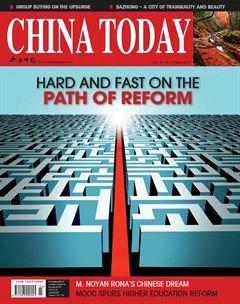Reflections on the New Administration, One Year on
The new Chinese leadership completes a full year in office in March. No two words sum up its signature policies better than “deepening reforms” – as reiterated by top leaders in multiple circumstances over the past year.
Last November, the Third Plenary Session of the 18th CPC Central Committee decided to comprehensively deepen reforms. The objective is to achieve decisive results by 2020 through reforms in important areas and crucial sectors by establishing institutions and systems that are structurally complete, scientifically standardized and operationally effective. Last December saw the setting up of a leading group for overall reforms with President Xi Jinping as chair. It consists of six sub-panels specializing in reforms to the economy and the environment, the legal system, cultural system and social system, CPC organization, and discipline oversight.
The government has also tackled corruption and pollution. In 2013, over 10 provincial-governorlevel officials were suspended or prosecuted, and around 20,000 government employees investigated. Most prominent among them was Bo Xilai, whose trial at the Jinan Intermediate Peoples Court was broadcast online in real-time via the courts micro-blog. Such openness and transparency of judicial proceedings being rare in the past, this is hailed as progress, as it keeps people better informed and elucidates law enforcement.
To curb the haze blighting 25 provinces, municipalities and autonomous regions across China, the State Council released an action plan last September to prevent and control air pollution, setting out 35 measures in 10 aspects, including reduction of emissions, optimization of industrial structures and mobilization of public participation. Specific targets were set for 2017, according to which local governments have worked out their own plans to improve air quality.
Chinese leaders were proactive in reaching out to the world in 2013. President Xi Jinping and Premier Li Keqiang made trips to 22 countries in Asia, Africa, Europe and the Americas, received 64 visiting heads of state, met with 300 senior officials from other countries, and signed close to 800 cooperation pacts. During President Xis visit to Russia, he and President Putin agreed to enhance the comprehensive strategic partnership between the two countries. During his visit to the U.S., Xi reached consensus with President Obama on building a new type of relationship between major powers. Chinese leaders also put forward several ideas on regional cooperation that have been well received internationally, including the New Silk Road Economic Belt, the 21st Century Marine Silk Road, an upgraded version of the China-ASEAN Free Trade Zone, an Asian infrastructure investment bank, a Bangladesh-China-India-Myanmar economic corridor, and a China-Pakistan economic corridor.
In 2013, the tertiary industry for the first time in Chinese history overtook the secondary industry, as the service sectors share in Chinas industrial composition hit 46.1 percent. A stronger service industry has been significant for job creation, reducing energy and resources consumption, and improving the national economys quality and performance. Meanwhile, China has also advanced its drive to eliminate outdated industrial capacity that has prompted transformation and upgrading of related industries. In addition, high-tech and emerging industries have been supported in a bid to create more markets for advanced industrial capacity.
Greater openness was also one of 2013s catchphrases. Last September the China (Shanghai) Pilot Free Trade Zone, the first of its kind on the mainland, began operation. It is expected to accumulate experience that can be replicated and put into broader use across the nation, in such areas as transforming government functions, innovating governance, developing greater openness in the service industry, and further opening up the finance sector.

